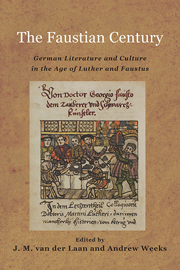Book contents
- Frontmatter
- Contents
- List of Illustrations
- Acknowledgments
- Introduction: Faust Scholarship and the Project at Hand
- 1 The German Faustian Century
- 2 Faustus of the Sixteenth Century: His Life, Legend, and Myth
- 3 Cornelius Agrippa's Double Presence in the Faustian Century
- 4 Converging Magical Legends: Faustus, Paracelsus, and Trithemius
- 5 Faust from Cipher to Sign and Pious to Profane
- 6 The Aesthetics of the 1587 Spies Historia von D. Johann Fausten
- 7 The Lutheran Faust: Repentance in the Augsburg Confession and the German Faustbuch
- 8 Marriage in the Historia von D. Johann Fausten (1587)
- 9 Antiauthoritarianism and the Problem of Knowledge in the Faustbuch
- 10 Exploring the “Three-Fold World”: Faust as Alchemist, Astrologer, and Magician
- 11 The Devil in the Early Modern World and in Sixteenth-Century German Devil Literature
- 12 Encounters with “Schwarz-Hans”: Jacob Böhme and the Literature of the Devil in the Sixteenth Century
- 13 D. Johann Faust and the Cannibals: Geographic Horizons in the Sixteenth Century
- A Sixteenth-Century Chronology of Significant References to Faust with Parallel World Events
- Select Bibliography
- Notes on the Contributors
- Index
4 - Converging Magical Legends: Faustus, Paracelsus, and Trithemius
Published online by Cambridge University Press: 05 May 2013
- Frontmatter
- Contents
- List of Illustrations
- Acknowledgments
- Introduction: Faust Scholarship and the Project at Hand
- 1 The German Faustian Century
- 2 Faustus of the Sixteenth Century: His Life, Legend, and Myth
- 3 Cornelius Agrippa's Double Presence in the Faustian Century
- 4 Converging Magical Legends: Faustus, Paracelsus, and Trithemius
- 5 Faust from Cipher to Sign and Pious to Profane
- 6 The Aesthetics of the 1587 Spies Historia von D. Johann Fausten
- 7 The Lutheran Faust: Repentance in the Augsburg Confession and the German Faustbuch
- 8 Marriage in the Historia von D. Johann Fausten (1587)
- 9 Antiauthoritarianism and the Problem of Knowledge in the Faustbuch
- 10 Exploring the “Three-Fold World”: Faust as Alchemist, Astrologer, and Magician
- 11 The Devil in the Early Modern World and in Sixteenth-Century German Devil Literature
- 12 Encounters with “Schwarz-Hans”: Jacob Böhme and the Literature of the Devil in the Sixteenth Century
- 13 D. Johann Faust and the Cannibals: Geographic Horizons in the Sixteenth Century
- A Sixteenth-Century Chronology of Significant References to Faust with Parallel World Events
- Select Bibliography
- Notes on the Contributors
- Index
Summary
Introduction to an Old Association
As early as 1834, two years after Goethe's death, the apparent resemblance of his Faust figure with Paracelsus led John S. Blackie, in the preface to his rendition of Goethe's tragedy into English verse, to the following statement: “There is much in all that is told of him [Faust] that recalls to our mind the biography of Paracelsus.” By the end of the nineteenth century, this assumption acquired a degree of certainty for Goethe scholars. In 1870, Gustav von Loeper remarked that Goethe's Faust is a physician and a physician's son, as is Paracelsus. Both figures detested the medicine of their time and had a predilection for the German language. Von Loeper's second edition (1879) added that the historical Faust and Paracelsus were both traveling scholars. Karl Julius Schröer in 1879, 1881, and 1886; Calvin Thomas in 1892; and Jacob Minor, in 1901, added to or qualified the assessment.
The efforts to shed light on the origins of the Faust character culminated in 1911 with Agnes Bartscherer's Paracelsus, Paracelsisten und Goethes Faust, which remains by far the most important study of this theme. Based on a profound knowledge of the Paracelsian works, she treats the metaphysical subjects that occur in the Faust tragedy: magic, demonology, alchemy, astrology, witchcraft, mantic arts, and cosmology. Bartscherer gives positive proof of the evident fact that the more the student of Goethe knows about Paracelsus, the more she discovers links to Faust.
- Type
- Chapter
- Information
- The Faustian CenturyGerman Literature and Culture in the Age of Luther and Faustus, pp. 93 - 124Publisher: Boydell & BrewerPrint publication year: 2013



